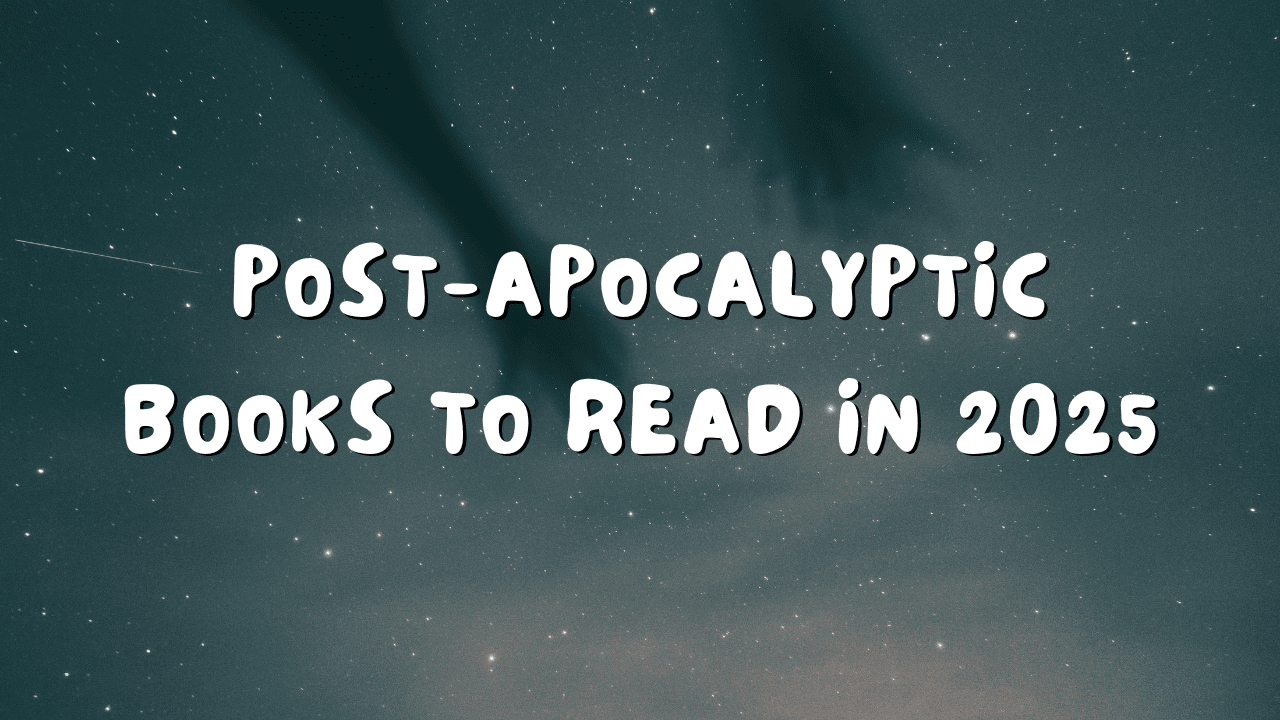If the world as we know it crumbled tomorrow, would you be prepared? Not just physically, but mentally? The post-apocalyptic genre has a special way of throwing us into chaotic worlds that are somehow even more captivating than our own. Whether it’s a viral outbreak, an environmental disaster, or something more bizarre, these books explore humanity’s survival when everything else falls apart.
Authors in the post-apocalyptic genre have the unique ability to make us question what we would do if our comfortable world was turned upside down. Do we rise above, cling to what’s left, or do we crumble? It’s thrilling, heart-wrenching, and sometimes a bit eerie—especially when these worlds feel all too possible.
As you can imagine, this genre is thriving right now, and with good reason. Who doesn’t love a good “what if” scenario? From explosive debuts to returning fan favorites, 2025 promises to deliver some of the best post-apocalyptic reads of the decade. So, get ready to dive into a world of survival, grit, and humanity’s fight to persist, even when everything else seems lost. Below, we’ve compiled a list of the 12 best post-apocalyptic books you need to pick up this year!
Table of Contents
Toggle12. The Parable of the Sower by Octavia E. Butler
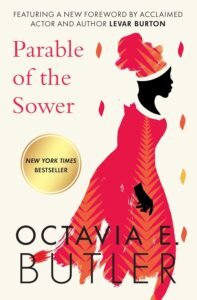
Claim Kindle Unlimited – 30 Days Free
Why You Should Read It
Butler’s The Parable of the Sower is a timeless classic that’s more relevant than ever. Set in a dystopian future plagued by climate change and social upheaval, it offers a powerful exploration of survival and hope. Plus, it’s got a fierce female protagonist who will make you rethink what it means to fight for your future.
What We Liked
Butler’s writing is stunning—thoughtful, deep, and incredibly thought-provoking. The world-building is rich and complex, and the themes of resilience are spot on.
What We Don’t Like
The novel’s pace can be slow at times, especially as Butler takes her time building the world and its social structures. Not the quickest read if you’re looking for a fast-paced thriller.
Book Review
The Parable of the Sower is a hauntingly realistic glimpse into a future where America has crumbled under the weight of environmental disasters and economic collapse. The story follows Lauren Olamina, a young woman with the ability to feel others’ pain, as she navigates a brutal new world. Butler’s portrayal of a fragmented society is both chilling and hopeful, as Lauren’s journey embodies the fight for humanity’s survival. What we love about this book is its exploration of how humans adapt and how community and empathy are essential to surviving in a broken world. Though the pacing can drag at times, Butler’s thoughtful examination of human nature makes this book an essential read for fans of the genre.
11. Station Eleven by Emily St. John Mandel
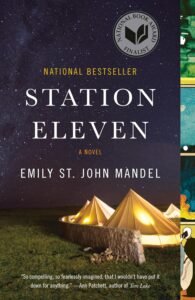
Claim Kindle Unlimited – 30 Days Free
Why You Should Read It
If you haven’t yet read Station Eleven, now’s the time to catch up. This novel weaves together the collapse of civilization due to a deadly pandemic with the lives of its survivors—particularly a group of traveling Shakespearean actors. It’s a haunting meditation on survival, art, and the things that connect us when everything else falls apart.
What We Liked
Mandel’s storytelling is mesmerizing. She expertly balances character development and world-building while weaving in deep philosophical questions about culture and humanity’s survival.
What We Don’t Like
Some readers might find the structure a bit confusing, as the book jumps between timelines and characters. It takes a bit of effort to piece everything together.
Book Review
Station Eleven isn’t your typical post-apocalyptic novel. Instead of focusing solely on survival, it takes a poignant look at the importance of art, memory, and human connection in a world that’s fallen apart. After a pandemic wipes out most of the world’s population, the story follows the lives of a traveling theater troupe as they perform Shakespeare’s plays in a post-collapse society. We loved Mandel’s deep exploration of how art and culture can remain even in the darkest times. The characters feel real, and the narrative is beautifully woven. While the timeline jumps can be a bit tricky to follow, the novel’s emotional depth and its nuanced take on the apocalypse make it a standout in the genre.
10. The Road by Cormac McCarthy
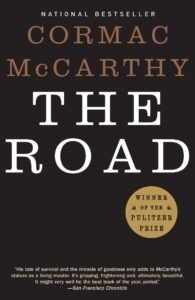
Claim Kindle Unlimited – 30 Days Free
Why You Should Read It
Widely regarded as one of the best post-apocalyptic novels ever written, The Road offers a harrowing and poetic portrayal of a father and son journeying through a world destroyed by an unnamed catastrophe. It’s a brutal, unflinching look at survival and love in a hopeless world.
What We Liked
McCarthy’s sparse, poetic prose is haunting and beautiful. The relationship between father and son is heart-wrenching and will stay with you long after you finish the book.
What We Don’t Like
It’s heavy—really heavy. The bleakness of the world McCarthy creates can be overwhelming, and some readers might find the lack of hope too much to bear.
Book Review
The Road is an emotional gut punch. Cormac McCarthy’s bleak portrayal of a post-apocalyptic world is filled with sorrow, but it’s also deeply moving. The novel follows a father and son as they travel through a devastated landscape, struggling to survive and hold onto their humanity. The world McCarthy paints is as empty and desolate as the emotional landscape of his characters, but it’s through their bond that we see the last flicker of hope. We loved McCarthy’s sparse, poetic writing, which perfectly captures the grim tone of the story. While it’s not a feel-good read by any means, The Road is an unforgettable exploration of love, survival, and the human spirit in the face of utter despair.
9. The Water Knife by Paolo Bacigalupi
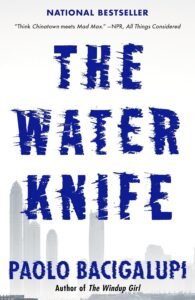
Claim Kindle Unlimited – 30 Days Free
Why You Should Read It
If you’re looking for a post-apocalyptic novel that tackles the real-world issue of water scarcity, look no further than The Water Knife. Set in a near-future America ravaged by climate change, this novel examines the consequences of water politics and survival in a drought-stricken world.
What We Liked
Bacigalupi is a master at creating tense, atmospheric settings. The stakes are high, and the exploration of water rights is both timely and chilling.
What We Don’t Like
The characters’ motivations can sometimes feel a bit murky, and the plot can be a little too political for some readers.
Book Review
The Water Knife presents a world where water is more valuable than gold, and those who control it hold the power. In a future where the American Southwest is a wasteland of drought, climate refugees, and political turmoil, three characters are caught in a dangerous game of survival. Bacigalupi’s exploration of resource scarcity is timely and compelling, making the book feel more like a warning than just fiction. We loved the way Bacigalupi creates a world where the fight for water is as brutal as any post-apocalyptic war. However, the novel’s sometimes dense political overtones and character motivations might not appeal to everyone. Despite that, The Water Knife is a gripping, thought-provoking read for fans of speculative fiction.
8. The Stand by Stephen King
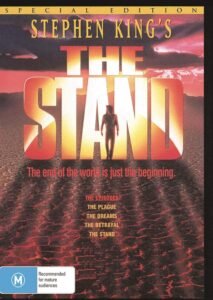
Claim Kindle Unlimited – 30 Days Free
Why You Should Read It
A classic in the post-apocalyptic genre, Stephen King’s The Stand is about as epic as it gets. After a virus wipes out most of the population, the survivors must battle between good and evil in a new world where survival is anything but guaranteed.
What We Liked
King’s ability to create relatable, multi-dimensional characters is unmatched. The moral and philosophical questions about society’s collapse are intriguing and thought-provoking.
What We Don’t Like
The novel is quite long, and some readers might find the pacing slow, especially in the beginning. It’s also a bit on the heavy side in terms of themes and its exploration of good versus evil.
Book Review
In The Stand, Stephen King crafts a post-apocalyptic world where a deadly virus has wiped out most of humanity, leaving behind a ragtag group of survivors. The survivors are then drawn into a battle between the forces of good, led by Mother Abagail, and the forces of evil, embodied by the sinister Randall Flagg. What makes The Stand so remarkable is King’s rich character development and his ability to weave suspense and tension into every page. We loved the book’s complex, multifaceted characters who each have their own moral struggles and desires. However, the book’s length and slower pacing might deter some readers, and its intense themes about good and evil can sometimes feel overwhelming. Still, The Stand remains a monumental post-apocalyptic novel that explores the fragility of civilization and the resilience of the human spirit.
7. The Girl With All the Gifts by M.R. Carey
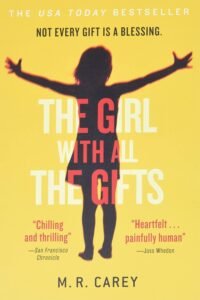
Claim Kindle Unlimited – 30 Days Free
Why You Should Read It
A fresh take on the zombie apocalypse, The Girl With All the Gifts takes us into a world where a group of children have been infected by a fungal disease that turns people into zombies. But these children are different. They may be the key to humanity’s survival.
What We Liked
The novel has a unique twist on the zombie genre and focuses on character development in a world on the brink of collapse. It’s a thrilling and emotionally charged read.
What We Don’t Like
Some of the plot twists are predictable, and there are moments where the pacing lags a bit in the middle.
Book Review
M.R. Carey’s The Girl With All the Gifts is a brilliant and unexpected take on the post-apocalyptic zombie genre. The story follows Melanie, a young girl who’s been kept in a military facility along with other infected children. Unlike the mindless, flesh-eating zombies we’re used to, Melanie and her friends retain their intelligence and consciousness, creating a fascinating moral dilemma. We loved the novel’s fresh perspective on survival and how Carey blends horror with emotional depth. Although some plot twists might feel predictable, the book is still a captivating read, offering a new look at the classic zombie apocalypse. If you’re a fan of horror and dystopian fiction, this is definitely one to add to your shelf.
6. The City We Became by N.K. Jemisin
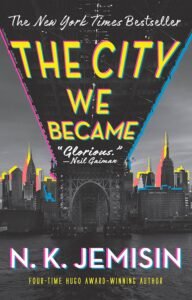
Claim Kindle Unlimited – 30 Days Free
Why You Should Read It
N.K. Jemisin’s The City We Became might not be the typical post-apocalyptic novel you’d expect, but trust us, it’s a unique and fascinating take. This book imagines New York City as a living entity and follows its boroughs as they fight against a malevolent force trying to destroy them.
What We Liked
Jemisin’s world-building is spectacular, and the book is full of rich, layered characters. The themes of urban life, resilience, and community shine through.
What We Don’t Like
The structure of the book can be a bit jarring at times, and it requires a bit of patience to fully immerse yourself in its world.
Book Review
While The City We Became doesn’t follow the typical end-of-the-world plot, it certainly brings its own kind of post-apocalyptic chaos. In this novel, New York City’s boroughs become living, breathing characters that must come together to fight an otherworldly force threatening to tear the city apart. Jemisin’s world-building is as detailed and immersive as you’d expect, and the characters are complex and compelling. We loved the book’s exploration of the city’s identity, the strength of community, and how each borough embodies a different aspect of humanity. While the novel’s structure can be challenging, and the action takes some time to build, the payoff is well worth it. This one’s for readers who love a unique twist on the post-apocalyptic genre.
5. Oryx and Crake by Margaret Atwood
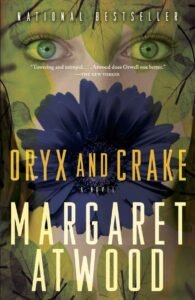
Claim Kindle Unlimited – 30 Days Free
Why You Should Read It
Atwood’s Oryx and Crake takes readers into a post-apocalyptic world where genetic engineering has gone horribly wrong. It’s a thrilling, cautionary tale about the dangers of tampering with nature—and a chilling warning for the future.
What We Liked
Atwood’s exploration of genetic engineering and its consequences is both thought-provoking and terrifying. The dystopian world she creates is believable and unsettling.
What We Don’t Like
Some of the narrative can be a bit slow, and it requires a patient reader. The tone is often dark and bleak, which may not appeal to everyone.
Book Review
Oryx and Crake is a gripping post-apocalyptic novel by Margaret Atwood that explores the consequences of genetic engineering gone awry. The novel follows Snowman, the last human survivor in a world devastated by a genetic experiment that turned out to be a disaster. Atwood’s exploration of science, ethics, and the environment is both timely and terrifying. We loved how the book blends speculative fiction with real-world issues like corporate greed, environmental collapse, and the dangers of unchecked scientific experimentation. While the novel’s slow pacing might be a turnoff for some, the world-building and thought-provoking themes make it a must-read for fans of dystopian fiction.
4. The Silent Stars Go By by James White
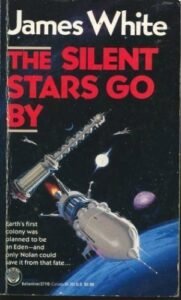
Claim Kindle Unlimited – 30 Days Free
Why You Should Read It
The authors of The Expanse series bring us another post-apocalyptic gem in The Silent Stars Go By. Set in a future where humanity has colonized space, this novel examines the collapse of civilization and the fight for survival in an uncertain future.
What We Liked
Corey’s world-building is top-notch, as usual, and the story has a strong emotional core. It’s a fantastic combination of hard science fiction and gripping survival drama.
What We Don’t Like
The pacing can be slow, and some of the scientific jargon might be overwhelming for readers unfamiliar with space exploration.
Book Review
In The Silent Stars Go By, James S.A. Corey presents a chilling vision of humanity’s future in the stars. The story follows a team of survivors struggling to rebuild civilization after a catastrophic event. What we loved about this book was the way Corey blends complex scientific concepts with personal stakes, making for a story that’s both intellectually stimulating and emotionally engaging. While the pacing may feel slow at times, the novel’s exploration of human resilience and the fight for survival in space makes it one of the best post-apocalyptic books of the year. If you’re a fan of hard science fiction and post-apocalyptic narratives, this book is definitely for you.
3. The Last of Us by Craig Mazin & Neil Druckmann
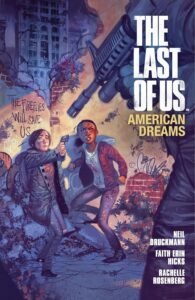
Claim Kindle Unlimited – 30 Days Free
Why You Should Read It
You’ve probably heard of the critically acclaimed video game The Last of Us, and now you can dive into the story that inspired it. Written by the creators of the game, this novelization explores the post-apocalyptic world of a fungal infection that wipes out much of humanity, leaving behind only the strong and the desperate.
What We Liked
The characters, Ellie and Joel, are deeply complex and emotionally compelling. Their journey through the remains of civilization is raw and gripping. Plus, the emotional stakes are impossibly high.
What We Don’t Like
If you’re already familiar with the game, there’s not a whole lot of new material in the book. It can feel like a retread of the same emotional beats, albeit in a more literary form.
Book Review
The Last of Us brings the gut-wrenching story of Joel and Ellie into novel form. After a fungal outbreak decimates humanity, the remaining survivors live in constant fear of the infected—and sometimes, even worse, the human survivors. The bond between Joel and Ellie, two unlikely companions, is the heart of this tale. What we love about this story is its emotional depth and its exploration of the lengths people will go to for survival. The book faithfully captures the tension, action, and psychological complexity of the game, making it a must-read for fans of the franchise. While some might find the story too familiar, the characters’ emotional journey and the book’s haunting portrayal of a ruined world are still incredibly powerful.
2. The Book of M by Peng Shepherd
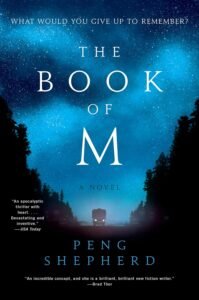
Claim Kindle Unlimited – 30 Days Free
Why You Should Read It
The Book of M is a brilliant, genre-blending novel that combines elements of post-apocalyptic survival with deep philosophical questions about memory, identity, and what it means to lose yourself. The plot follows a group of survivors in a world where people’s memories start to disappear, leaving them to grapple with their changing identities in a ravaged world.
What We Liked
The premise is fascinating and unique, blending dystopia with philosophical exploration. The writing is lush, evocative, and deeply emotional.
What We Don’t Like
The narrative can be a bit complex and abstract at times, and the pacing is on the slower side. It’s a novel that requires patience and reflection.
Book Review
Peng Shepherd’s The Book of M is an inventive and thought-provoking take on the post-apocalyptic genre. The story takes place in a world where people’s memories begin to vanish, causing them to lose their sense of self. As society crumbles, the survivors must navigate a world that’s falling apart both physically and mentally. What we loved about this book is how it tackles the theme of memory—not just as a personal experience, but as something that shapes society and humanity itself. While the plot may be slow at times and the themes complex, Shepherd’s writing is absolutely stunning, making it a worthwhile read for those who love a deep, contemplative post-apocalyptic tale.
1. Cloud Atlas by David Mitchell
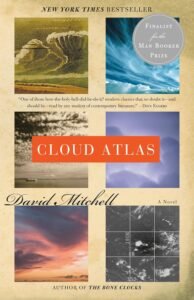
Claim Kindle Unlimited – 30 Days Free
Why You Should Read It
Cloud Atlas might seem like a strange choice for a post-apocalyptic list, but trust us, it earns its spot. The novel is a complex, layered narrative that spans hundreds of years and ties together multiple stories across time, all of which reflect humanity’s fight for survival, even after society has crumbled.
What We Liked
Mitchell’s writing is phenomenal. The interconnected stories are captivating, and the way the author explores themes of fate, survival, and human resilience is brilliant.
What We Don’t Like
The book’s structure can be confusing, with its intertwining narratives jumping between timelines. It requires readers to pay close attention, and it’s not always an easy read.
Book Review
David Mitchell’s Cloud Atlas is a mind-bending, genre-defying novel that examines the connections between humanity, survival, and the legacy we leave behind. The book weaves together six seemingly unrelated stories, spanning centuries, and slowly reveals how each narrative affects the others. From a 19th-century voyage to a post-apocalyptic world, the stories explore the human condition and our collective fight for survival. We loved the intricate storytelling and the way Mitchell challenges readers to consider how individual actions ripple through time. While the structure might be confusing and requires patience, Cloud Atlas offers a deeply rewarding reading experience for those willing to dive in. It’s a masterful exploration of humanity’s eternal struggle to survive and thrive, no matter the odds.
Conclusion
Post-apocalyptic novels offer a wide range of experiences, from gut-wrenching survival stories to philosophical explorations of humanity’s future. In 2025, these books are proving that the genre is still thriving, offering new perspectives and unforgettable characters that stay with you long after the world ends. Whether you’re in the mood for a complex narrative like Cloud Atlas or a character-driven tale like The Road, these books will transport you to bleak, yet fascinating, worlds.

